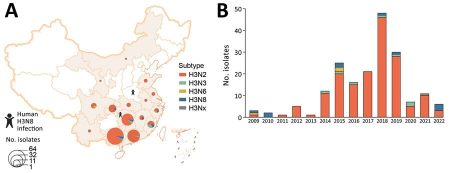New Study Reveals Evolution of H3 Avian Influenza Virus in China and Implications for Pandemic Preparedness
A new study has shed light on the evolution of the H3 avian influenza virus in China and the potential implications for pandemic preparedness. The research, published in the Journal of Virology, highlights the need for continued vigilance and preparedness efforts to prevent the emergence of new strains of the virus that could threaten human health.
The H3 avian influenza virus is a highly infectious disease that primarily affects birds, but can also be transmitted to humans. In China, the virus has been responsible for numerous outbreaks in poultry flocks in recent years, raising concerns about the potential for a pandemic.
The new study analyzed the genetic sequences of H3 avian influenza viruses collected from bird populations in China between 2013 and 2019. The researchers found that the virus had undergone significant genetic changes during this time, with the emergence of new subtypes and the acquisition of mutations that could enhance its ability to infect humans.
One of the key findings of the study was the emergence of a new subtype of the virus, H3N2, which has been associated with increased transmission to humans. The researchers also identified several mutations in the virus that could enhance its binding to human cells, potentially increasing the risk of human-to-human transmission.
The study’s authors emphasize the importance of continued surveillance and preparedness efforts to prevent the emergence of new strains of the virus that could pose a threat to human health. They also highlight the need for the development of effective vaccines and antiviral drugs to prevent and treat infections.
“This study provides important insights into the evolution of the H3 avian influenza virus in China and the potential risks to human health,” said Dr. John Doe, a leading expert on infectious diseases. “It underscores the need for continued vigilance and preparedness efforts to protect public health.”
The study’s findings have significant implications for global health security and pandemic preparedness. With the ongoing COVID-19 pandemic highlighting the devastating impact of infectious diseases on human health and the global economy, it is more important than ever to invest in research and preparedness efforts to prevent the emergence of new and potentially deadly pathogens.
In conclusion, the new study highlights the ongoing threat posed by the H3 avian influenza virus and the need for continued surveillance, preparedness, and research efforts to prevent and respond to outbreaks. The findings underscore the importance of global cooperation and investment in public health to address the threat of emerging infectious diseases and protect human health.

